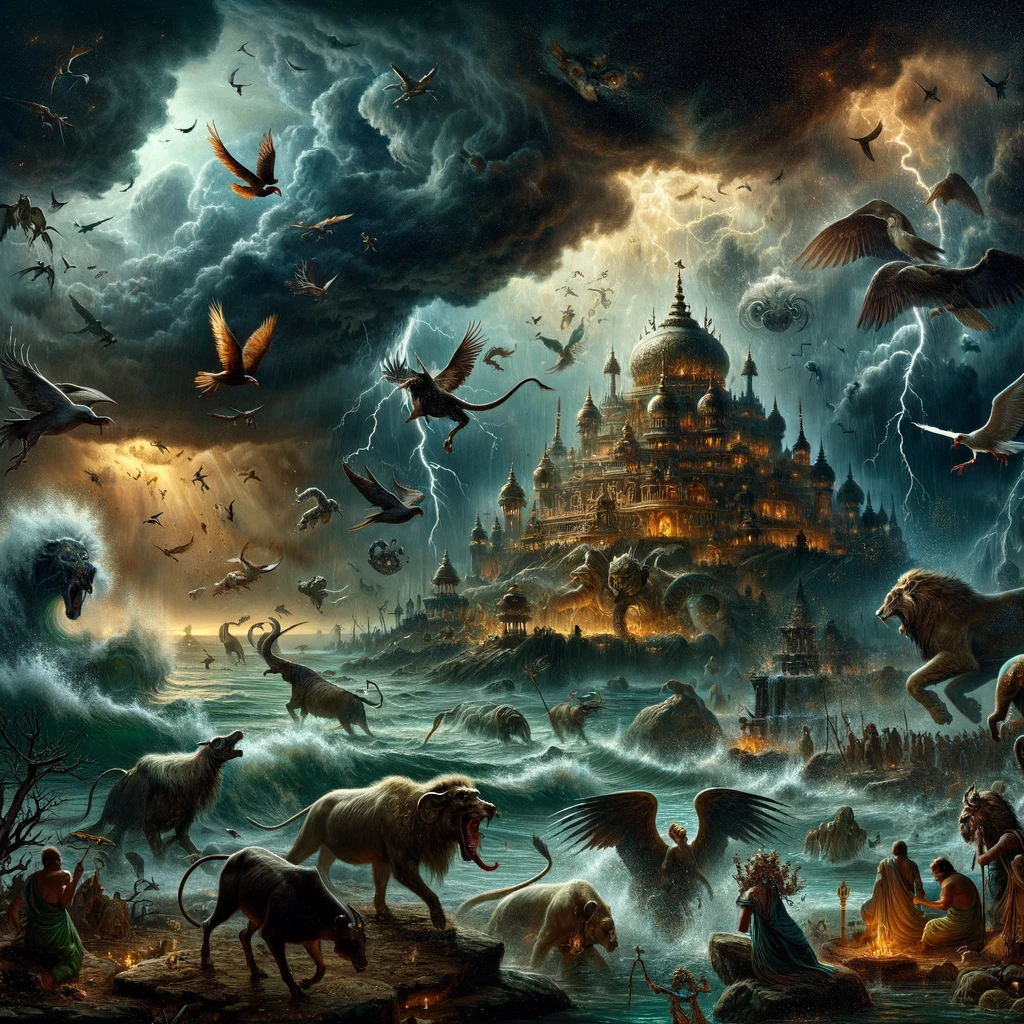Excited, Ravana’s charioteer drove the chariot capable of crushing enemy armies forward. It resembled a magical city of the gandharvas. It bore a lofty flag. It was drawn by steeds with excellent qualities and gold trappings. The chariot was full of weapons of war and decorated with rows of pennants. The chariot seemed to be swallowing space as it moved and made the earth resound. It was the cause of destruction for the enemy army and a cause of joy for one’s own army. The charioteer quickly conducted Ravana’s chariot. Rama saw Ravana’s chariot approaching suddenly and rattling. The chariot was drawn by blackish steeds and had an ominous luster. It was shining in space like an aerial ship bathed with sun rays. It was covered with a multitude of pennants that shone like lightning and looked resplendent like a rainbow. It resembled a storm cloud that was showering down arrows instead of rain.
Seeing the enemy’s chariot approaching like a cloud and rumbling like a mountain burst into pieces by a thunderbolt, Rama stretched His bow with force until it formed a half-moon and said to Indra’s charioteer Matali: From the way in which Ravana is rushing from left to right once again, it appears that he has set his mind on killing himself in combat. Therefore, be alert and draw near to the enemy’s chariot. I want to destroy it as the wind would destroy a rising cloud. Drive this chariot swiftly, without confusion or bewilderment, with a concentrated mind and vision, and full control of the reins. To be sure, you do not need to be instructed, being Indra’s charioteer. Desirous as I am of fighting and focused on that, I merely remind you, not instruct you.” Extremely pleased by Rama’s words, Matali, the outstanding charioteer of the gods, drove the chariot. Passing Ravana’s large chariot on the right, the dust raised by the wheels covered Ravana. With his copper-red eyes wide open due to anger, Ravana struck Rama, who was facing his chariot, with arrows. Joining anger to patience when provoked in this way, Rama grabbed hold of Indra’s high-impact bow and swift arrows that sparkled like sunbeams. Then a great conflict broke out between the two warriors who were facing each other like two proud lions eager to kill each other.
Then gods, gandharvas, siddhas and great sages gathered to watch the duel, anxious as they were for Ravana’s death. At that time ominous hair-raising omens appeared, presaging the death of Ravana and the success of Rama. The god of rain showered down blood over Ravana’s chariot. Violent whirlwinds blew from left to right. In the sky a huge flock of vultures hovered; wherever the chariot went, they hurried after. Lanka was light up with the colors of sunset, like a red hibiscus flower, even though it was daytime, and the region around the city seemed to glow. Huge meteors fell with a loud crash, foreboding ill for Ravana, so that the rakshasas became despondent.
Wherever Ravana went, the ground shook, and the arms of the rakshasas seemed to be restrained when they tried to hit. The sunbeams shining before Ravana were coppery, yellow, white and dark, like the metallic ores on a mountain. Seeing Ravana’s angry face, she-jackals followed by vultures vomited flames from their mouths and howled in an inauspicious manner. The wind blew in a way unfavorable to Ravana, raising clouds of dust over the battlefield and dimming Ravana’s vision. Without the presence of any clouds, startling bolts of lightning fell everywhere with unbearable crashes of thunder. The cardinal directions and the intermediate directions were shrouded in darkness, and because of a shower of dust, the sky became obscured.
Quarrelling with each other fiercely, frightened mynah birds shrieked and fell by the hundreds on top of the chariot. With sparks flying off from their thighs and tears pouring down from their eyes, the horses were simultaneously producing fire and water. Many such ominous omens appeared, foreboding the destruction of Ravana. Auspicious omens indicating Rama’s victory appeared all about. Seeing the good omens heralding His victory, Rama felt extremely delighted and considered Ravana already dead. Because Rama was knowledgeable about omens, He was overjoyed and supremely ecstatic to see good omens on His own body, and exhibited even greater prowess in combat.
Thus completes 106th Chapter of Yuddha Kanda of the glorious Ramayana of Valmiki, the work of a sage and the oldest epic.
Sriman Moola Rama Vijayate


